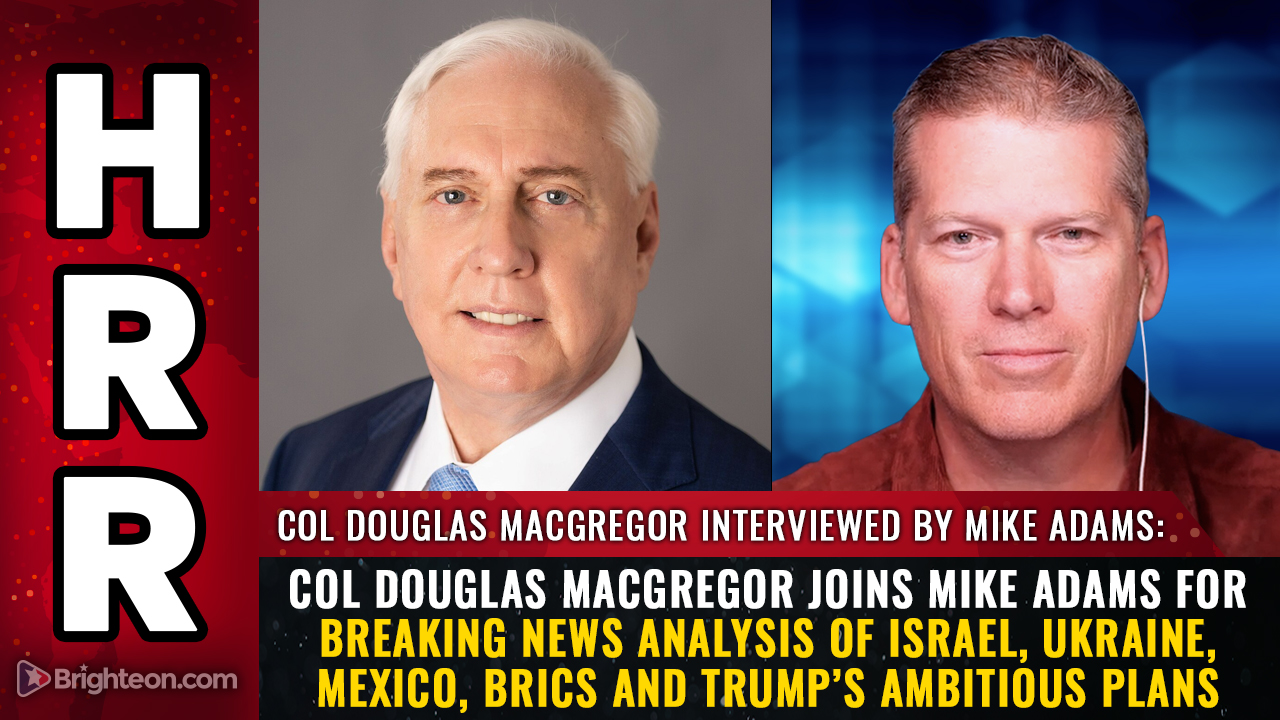 Parler
Parler Gab
Gab
- Colonel MacGregor warns of U.S. economic and military decline, criticizing the fantasy of unipolar dominance and the drop in U.S. global GDP share from over 50% to 20%.
- MacGregor highlights economic challenges, including peak oil production and the inefficacy of tariffs, advocating for a reevaluation of energy and trade policies.
- He calls for a major overhaul of the U.S. military, describing it as outdated and ill-prepared for modern conflicts, and urges a strategic reorganization to face new geopolitical realities.
- MacGregor advises disengagement from the Ukraine conflict and a cautious approach to Middle Eastern tensions, emphasizing the risks of war with Iran and the importance of diplomacy.
- He stresses the need for securing the U.S.-Mexico border with military presence and advanced technology, framing it as an existential issue, and advocates for a new national strategy focused on domestic and economic security.
Economic realities and energy challenges
The discussion then turned to the economic challenges facing the U.S. MacGregor emphasized that the U.S. has reached peak oil production and that reversing this trend will take years, not months. He criticized the current administration's reliance on outdated strategies and the mismanagement of the energy sector, which has left the U.S. vulnerable to global energy dynamics. MacGregor also highlighted the inefficacy of tariffs, arguing that they must be judiciously applied and that China, in particular, cannot be effectively tariffed due to its economic strength.Military and strategic overhaul
MacGregor's critique extended to the Department of Defense, which he described as suffering from "terminal cancer." He argued that the U.S. military is still organized to fight World War II and is ill-prepared for modern conflicts. He called for a profound reorganization, including the retirement of senior officers and a fundamental change in military strategy. This, he said, must be part of a broader national strategy that recognizes the multipolar nature of the world and the need to adapt to new geopolitical realities. Addressing the ongoing conflict in Ukraine, MacGregor stressed that Russia is not in a hurry and that the U.S. has no leverage to influence the situation. He criticized the continued U.S. aid to Ukraine, which he described as largely stolen, and urged a disengagement from the conflict. MacGregor suggested that the U.S. should withdraw its forces and cut aid, which would likely lead to an end to the war and a reduction in casualties. The conversation also touched on the Middle East, particularly Israel. MacGregor warned of the growing anti-Israel sentiment in the region and the potential for a wider conflict. He noted that Iran, despite its portrayal in the media, has the potential to become a modern state and that a war with Iran would be disastrous. MacGregor urged caution and a focus on diplomacy, emphasizing that the U.S. should not be drawn into conflicts that do not serve its national interests.Domestic security and the border crisis
Finally, MacGregor discussed the security challenges on the U.S.-Mexico border. He criticized the influence of drug cartels and called for a robust military presence to secure the border. He proposed a combination of regular army and National Guard forces, equipped with advanced surveillance technology, to control the flow of illegal drugs and immigrants. MacGregor argued that securing the border is an existential issue for the U.S. and that it should be a top priority.A call for a new national strategy
Throughout the interview, MacGregor emphasized the need for a new national strategy that prioritizes America's interests and adapts to the multipolar world. He called for a reevaluation of U.S. foreign policy, a focus on economic recovery, and a reorganization of the military to meet modern challenges. MacGregor's warnings and recommendations offer a stark but necessary perspective on the future of U.S. power and influence in a rapidly changing world. Watch this full episode of the "Health Ranger Report" with Mike Adams, the Health Ranger, and Col. Douglas MacGregor as they discuss about breaking news analysis of Israel, Ukraine, Mexico, BRICS and Trump’s ambitious plans. This video is from the Health Ranger Report channel on Brighteon.com.More related stories:
Germany rejects Trump’s call for increased military spending BRICS rejects dollar challenge: No plans for common currency, but dollar dominance under scrutiny John Perkins and Mike Adams warn of U.S. economic decline as China rises: The new era of global power dynamics Sources include: Brighteon.com OurCountryOurChoice.comIRS in the crosshairs: Elon Musk’s top aide arrives as taxpayers brace for turmoil
By Willow Tohi // Share
TikTok returns to U.S. app stores amid legal uncertainty and national security concerns
By Cassie B. // Share
Ex-USAID director exposes deep-rooted corruption and waste
By News Editors // Share
Musk mocks pro-Western Russian and Ukrainian media outlets amid USAID funding freeze
By Belle Carter // Share
Governments continue to obscure COVID-19 vaccine data amid rising concerns over excess deaths
By patricklewis // Share
Tech giant Microsoft backs EXTINCTION with its support of carbon capture programs
By ramontomeydw // Share
Germany to resume arms exports to Israel despite repeated ceasefire violations
By isabelle // Share










